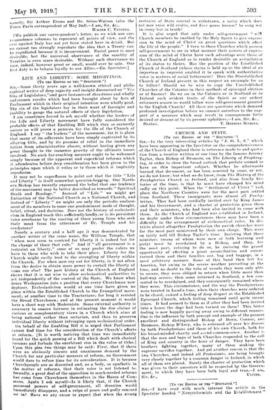LIFE' AND LIBERTY : SOME MISGIVINGS. (To THE EDITOR OF
THE ° SPECTATOIL") Sth,—Some thirty years ago a well-known ethical and philo- sophical writer of deep sagacity and insight discoursed on "Tice Sins of Legislators,"and gave instancesof disastrous and wholly unforeseen results which had been brought about by Acts of Parliament which in their original intention were wholly good. The sin of the legislators lay in their want of foresight and inability to gauge the natural effects of their legislation.
I am sometimes forced to ask myself whether the leaders of
the Life and Liberty movement have fully considered the probable effects of that Enabling Bill which they so earnestly assure us will prove a panacea for the ills of the Church of England. I say " the leaders" of the movement, for it is plain that many of its adherents have been simply captivated by its alluring title, and by its promise of relief in the immediate futOre from administrative abuses, without having given any great thought to the immense gravity of the ultimate issues involved. No such far-reaching measure ought to be welcomed simply because of the apparent and superficial reforms which it adumbrates before deep consideration has been given to the principles upon which it relies or to those which it implicitly repudiates.
It may not he superfluous to point out that the title "Life and Liberty " is itself somewhat question-begging. One North- ern Bishop has recently expressed the belief that one tendency of the movement may be better described as towards " Spiritical Death and Bondage." Instead of "Life " we might get Extinction of the National Church as a National Church, and instead of "Liberty" we might see only the periodic enslave. client of its members to some one predominant mode of thought, belief, ritual, and doctrine. Does not the history of ecclesiasti- cism in England teach this sufficientlyloudly, or is its persistent voice overborne by the roaring of those young lions who seek their meat from the utterances of Dr. Temple and his coadjutors?
Nearly a century and a half ago it was demonstrated by another writer of the same name, Sir William Temple, that " when men seem to contend for liberty it is indeed but for the change of those that rule." And if "all government is a restraint on liberty," some of us may prefer the rulers we have to those who wish to take their place. Liberty for the Church might easily lead to the strangling of liberty within the Church. For when men cry out for liberty, is it not often from the desire to obtain more power to curtail the liberty of some one else? The past history of the Church of England shows that it is not wise to allow ecclesiastical authorities to act independently of the control of the State. We know what drove Wesleyanism into a position that every Churchman now deplores. Ecclesiasticism would at one time have given no place within the Established Church to the Evangelical move- ment; at another time to the Tractarians; for long it resisted theBroad Churchmen; and at the present moment it would have a short way with Modernists. Some external authority is necessary to ensure fairness in estimating the due claims of various or complementary views in a Church which aims at being national rather than sectarian, and thus to preserve individual liberty without infringing upon ecclesiastical order.
On behalf of the Enabling Bill it is urged that Parliament
cannot find time for the consideration of the Church's efforts at reform. [It is worth noticing that time was immediately found for the quick passing of a Bill which dealt with clerical incomes and forbade the exorbitant rise in the value of tithe.] Upon this plea two things may be said: First, that if there were an obviously sincere and unanimous demand by the Church for any particular measure of reform, no Government would dare to refuse time for its consideration. It is because Churchpeople are so disunited and, as a body, so apathetic in the matter of reforms, that their voice is not listened to. Secondly, a great deal of the opposition to much-needed reforms has come from Churchmen themselves in the House of Com- MODS. Again I ask myself—Is it likely that, if the Church Possessed powers of self-government, all disunion would Immediately disappear, and a reign of peace and godly concord set in? Have we any cause to expect that when the strong
restraint of State control is withdrawn, a unity which does not now exist will evolve, and Here gum,: bottom! be sung not in irony but in truth?
It is also urged that only under self-government " wile Church members be enabled by the Holy Spirit to give expres- sion to the mind of Christ on great questions which affect the life of the people." I turn to those Churches which possess self-government to see in what manner their powers of expres- sion of the mind of Christ have such advantage over those of the Church of England as to render desirable an assimilation of its status to theirs. Has the positiou of the Established Church of Scotland (whose status is held up as the ideal of an imperium is imperio) enabled it to speak with authoritative voice in scatters of social betterment? Does the Disestablished Church of Ireland present in this respect an ensample for Ils to follow? Should we be wise to copy the tnestahlished Churches of the Colonies in their methods of episcopal election or of finance? Do we see in the Colonies or in Scotland or in Ireland such evident fruits of the Spirit as our ardent reformers assure us would follow were self-government granted to the English Church? All these are questions which demos! profound investigation before we commit ourselves to the sup- port of a measure which may result in consequences little desired or dreamt of by its present upholders.—I am, Sir, &c.,






































 Previous page
Previous page